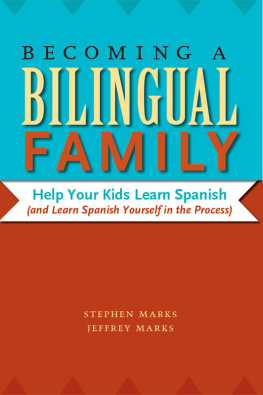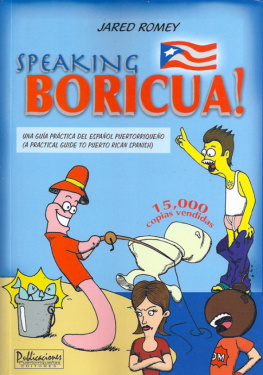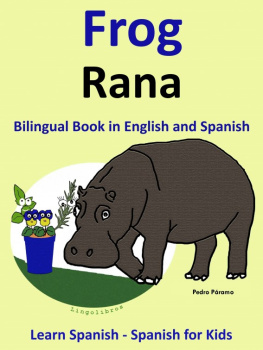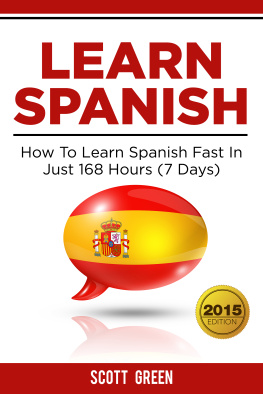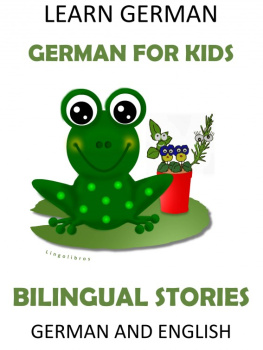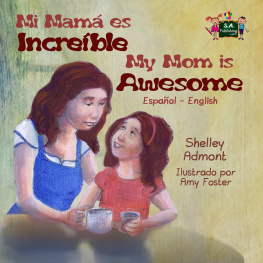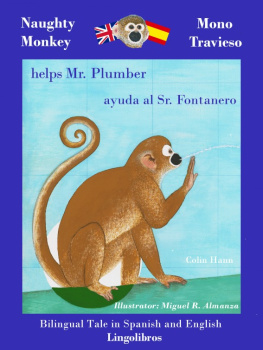BECOMING A
BILINGUAL
FAMILY
Help Your Kids Learn Spanish
(and Learn Spanish Yourself in the Process)
BY STEPHEN MARKS
AND JEFFREY MARKS

University Of Texas Press
AUSTIN
Copyright 2013 by Stephen Marks and Jeffrey Marks
All rights reserved
Printed in the United States of America
First edition, 2013
Requests for permission to reproduce material from this work should be sent to:
Permissions
University of Texas Press
P.O. Box 7819
Austin, TX 78713-7819
http://utpress/utexas.edu/about/book-permissions
LIBRARY OF CONGRESS CATALOGING-IN-PUBLICATION DATA
Marks, Stephen G. (Stephen Gary), 1952
Becoming a bilingual family : help your kids learn Spanish (and learn Spanish yourself in the process) / by Stephen Marks and Jeffrey Marks.1st ed.
p. cm.
Includes bibliographical references and index.
ISBN 978-0-292-74363-2 (pbk. : alk. paper)
1. Bilingualism in children. 2. Parenting. 3. ChildrenLanguage. I. Marks, Jeffrey R. (Jeffery Robert), 1957 II. Title.
P115.2.M37 2013
420.42610973dc23 2012037681
doi:10.7560/743632
Illustrations courtesy of The Graphics Factory
ISBN 978-0-292-74364-9 (e-book)
ISBN 978-0-292-74375-5 (individual e-book)
We dedicate this book to our kids:
Olivia, Alex, Claire, Adrian, and Sara
CONTENTS
BECOMING A BILINGUAL FAMILY
BECOMING A BILINGUAL FAMILY
THE JOURNEY TO BILINGUALISM

WHAT THIS BOOK IS ABOUT... AND OTHER THOUGHTS

This is the tour guide and phrase book for the voyage of a lifetime, a voyage that you will be taking with your kids. It is a voyage to bilingualism and, more than that, a voyage to the cultures and the peoples that make up the Spanish-speaking world. It is a voyage that begins in your own backyard, for indeed millions of your paisanos (countrymen and women) are fluent speakers of Spanish.
We wrote this book for English-speaking parents who wish to raise their children to speak both English and Spanish. From our own experience in raising bilingual children, and from talking to many other parents, we have become convinced of four things: First, raising a child bilingually is one of the most valuable experiences in early childhood education. (More on this later.) Second, many parents recognize this value and would give the gift of bilingualism to their children if they only knew how. Third, most parents are interested in sharing this learning experience with their kids but do not know where to begin. (This included us.) Finally, traditional language instruction materials do not prepare parents to talk to their kids. Indeed, even parents who have studied a significant amount of Spanish find that they have neither the vocabulary nor the sentence structure for kid talk.
Over the years many parents have approached us, some complete strangers on the street, to ask us how we have managed to raise our kids bilingually. As we have come to share our experiences with others and to reflect upon them ourselves, we have found ourselves giving advice that really boils down to two simple and related educational principles. The first is that bilingual education for young children is simply a matter of creating a bilingual environment. That is, language acquisition in young children is not at all about instructing children in the language. Rather, it has everything to do with creating an environment in which children are in contact with the language. Because children are gifted language learners, they do not need language classes. They only need a bilingual environment to attain proficiency. The next chapter in this book shows you how to create a bilingual environment in your home and in your childs life.
The second principle is that you the parent are a very important part of that bilingual environment. Your willingness to learn along with your children and speak Spanish to them, especially in the early years, will enhance their bilingual environment in two ways. First, it will give your children an additional source of Spanish, a bit more of the day in which they hear and speak the language. More importantly, however, the mere fact that mami or papi is speaking Spanish in the house provides a powerful role model for your children. The fact that you are interested in Spanish, that you find it fun and exciting, will be internalized by your children and will contribute to making language learning a lifelong love of theirs. This motivational aspect of your childs environment leads us to the one cardinal rule underlying this book:
La regla ms importante!
(The Most Important Rule!)
Speak to Your Kids in Spanish!
(Even if incorrectly.)
This book is designed to give you the confidence to speak to your kids in Spanish. It provides you with the vocabulary and structures you will use daily. You will be learning along with your kids.
WHY RAISE YOUR KIDS BILINGUALLY?

Most of the parents we meet are convinced of the benefits of raising children bilingually. Your interest in this book suggests that you have already considered the merits of this endeavor and are intrigued by the possibility. Occasionally, however, parents who do not understand why we would do such a thing ask us to justify our choice.
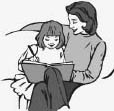
Part of the answer is the old notion that parents inflict upon their kids that which they wish their parents had inflicted upon them. (Yes, our kids take music lessons as well.) Like many people, we have a fascination with language. Yet language acquisition can be a trying proposition for adults. If only our parents had taught us a second language as children! In Bilingual Babes: Teach Your Child a Second Language, Ilisa Cohen explains:
Why are so many families jumping on the bilingual bandwagon? In our increasingly global world, parents realize that their kids will benefit from knowing more than one language, says Nancy Rhodes, director of foreign-language education at the Center for Applied Linguistics, in Washington, DC. Theres definitely been a grassroots push for more bilingual education in preschools. Exposing your child to a second language will help him learn about other cultures. Research has shown that bilinguals tend to be more creative thinkers than those who speak one language, and one study suggests that their brain functions may stay sharper as they age.
There are many reasons to raise children bilingually, including the following:
1. Knowing another language is an asset that will help our children survive and thrive in the world. The world is becoming more international every day, and those with language skills are more in demand and have a greater variety of prospects open to them. On average, bilingual speakers exceed their monolingual counterparts in earnings.
2. Learning two languages early on makes additional language acquisition in adulthood that much easier. Barbara Zurer Pearson, bilingualism expert and author of

